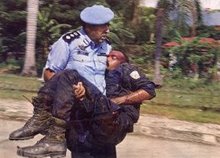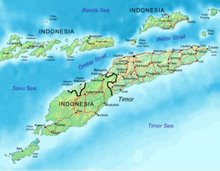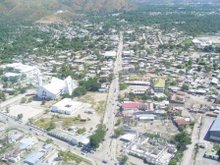
By Sammy Mwiti, Communications Officer.
Speaking in a slow, labored and sad voice, Mr. Jorge Lafu, a native of Nibin village, Oesillo sub-district of Oecessi recounts the psychological impact of the infamous 1999 massacre on his community.¬ "We were terribly traumatized," he says, referring to the incident on 8th September 1999, or the so called "Black September" when in an unprecedented orgy of terror and destruction, Pro-Indonesian militias killed 82 people in the area, days after the announcement of the referendum results which overwhelmingly favored the independence vote. Among the first victims was his village chief, Mr. Armando Sani. It's a loss he says, the community finds very difficult to cope with, because it shattered lives and livelihoods forever.
But courtesy of support provided by UNDP, Jorge is now at the forefront of a comprehensive recovery and post-conflict reconstruction effort which when fully accomplished, may offer a case study in strategic nation-building. Jorge is a Community Activation Facilitator (CAF), one of 18 employed under the Oecussi Community Activation Programme (OCAP) of UNDP. It is a project that blends elements of innovative farming technology, community mobilization techniques and micro-credit enterprises to facilitate sustainable development in a territory blighted by chronic poverty, social injustice and geographic isolation. Oecussi with an estimated 64,000 population is the poorest of the 13 districts in the country, rating the lowest in attainment of Millennium Development Goals, and other indicators. An enclave that's not easily accessible from the mainland by land or sea, it poses a communications nightmare to hordes of development workers based in the area and other personnel.
The EURO 3.3 million European Commission funded five-year project which ends in 2009 emphasizes on building institutions for the poor. Community facilitators like Jorge who have varied working experience have been instrumental in establishing a record 241 Self Help Groups (SHG) so far, responsible for a wide array of socio-economic activities ranging from vegetable production and block demonstrations to seed multiplication as well as well variety selection programmes. Also incorporated are sloping agricultural land technology (SALT) and drip irrigation techniques.
Among the chief OCAP counterparts are the Office of the Secretary of State for Oecussi (SOS), District Programme Working Committee and the Ministry of Agriculture and Fisheries and Ministry of Development. "Our approach is fairly simple," explains Mr. Jaiswal Jitendra, the agricultural specialist for OCAP. "The groups provide training and experimental opportunities where the members are exposed to improved farming techniques. They also receive tools, seeds and fertilizers." Jaiswal, as he is better known, comes from Nepal where he honed his skills before joining the UNDP's United Nations Volunteers (UNV) Programme. He has been based in Oecussi for two years and speaks the Timor-Leste's national language Tetum, fluently.
"From the group, individuals replicate the practices in their own gardens and villages, creating a multiplier effect" relates Jaiswal. The group membership is roughly a dozen each. Through the group, members can also avail savings and credit facilities, he says. They can equally explore commercial or large-scale farming. "I would like other people especially women to visit us and learn from our success," Mrs. Maria Bana 20, remarks. She is a member of the "Tetebau" group in Bobocase village, which specializes in vegetable cultivation. "I will continue being a member of this group because it is beneficial to me. I can work here and earn some money to support my family." The group concept has been useful in promoting peace and reconciliation, reckons Mrs. Merita De Jesus Marques, a Council of State member to the President's Office who is also the Coordinator of OCAP's Community Development Fund (CDF), the avenue for communities to propose community development projects. "By coming together as a group, people are able to deal with the trauma of the past collectively," she says, noting that increased work and income generating opportunities tend to create a sense of healing, a catharsis of sorts.
It's not all been smooth-sailing, however. Poor skills (especially in rural agriculture) at the local level coupled with weak coordination mechanisms and a poor infrastructure, marketing and communication network have played havoc with some of the plans, leading to delays in implementation. Pests have also proved to be a real nuisance, defying frequent attempts to eradicate them scientifically. Other problems are of a technical nature. "It must be recognized that once SHGs are established, the programme also creates high expectations from the community SHGs," notes Mr. Koen Walter Toonen, OCAP Chief Technical Advisor, in a recent report. "Sometimes they expect financial inputs for savings and/or credit, or equipment but certainly continuous support particularly in opening up markets for their products." Hoping to capitalize on the area's potential, two new micro-finance organizations the Moris-Rasik and IMfTL opened new branches in Oecusse recently. Contending that it is of "utmost importance" that these microfinance institutions succeed, Koen cites experience from other countries, saying if microfinance organizations are not able to financially break even, "a potential collapse of the organization puts poor people into debt or at least leads them to lose savings." Meanwhile Jorge Lafu sees the increasing popularity of the self-help groups as evidence of a new awakening, which augurs well for the future. "I have received requests from 20 people seeking learn from our example, and establishing their own groups," he says adding, "people are keen to rebuild their lives and they view the groups as promising, as a fresh start. That is very good," he says.
















